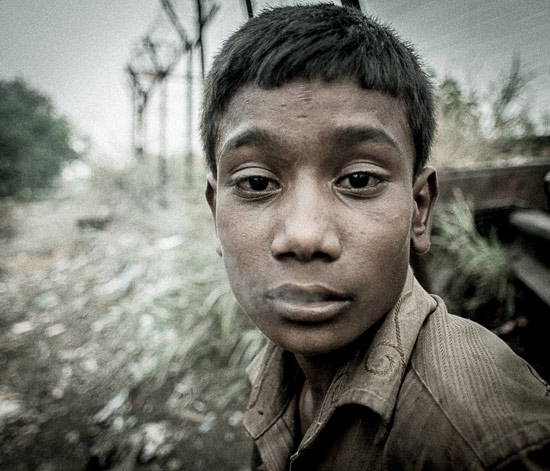
Rituparna Banerjee is a photographer based in New Delhi. Here is her story about the approximately 1,200 residents of what is essentially a two-square-mile slum at the Yamuna Bazaar in Delhi.
"A walk into these very spaces reveals a grim reality. Vials of familiar anti-allergic medication, syringes and needles lie littered about in the dirt; huddles of small groups of men, women and children with their backs to you; their decaying bodies and reddened eyes, are a clear giveaway. We approached one of them. "I have been using drugs since I was 12...it's been over 14 years now, my wife left me. I continue to live like this", says Siddharth. When asked how he can afford it, he narrates with interest how begging and picking pockets are popular sources of income. "Each packet of crack costs me about four hundred rupees ($7), it keeps me high for about two hours; I take it 2-3 times a day. I can't live without this," he adds. Siddharth is one of the hordes of homeless people in Yamuna Bazaar whose life, income and expenditure revolve around the intoxicating chemicals he consumes every day.
Half the addicts encountered are children. Their days are spent in the nearby railway area of the Wazirabad cargo depot. Moreover, their addiction continues well into adulthood, as testified by Siddharth. The children often turn to violence in desperation to get their hands on chemicals to cause intoxication. Chintan, a minor barely thirteen, shows the slash marks of a razor blade on his friend's chest. They are both from Darbhanga in Bihar. Holding a the tube of rubber solution used by cobblers and packers as glue, a 10 year old says, "I inhale this all day," with most of his face concealed beneath a cloth towel doused in the substance.
Substance abuse has been reported in many instances to reach uncontrollable proportions, and these images essay the condition of occupants of the Yamuna Bazaar area. Their peculiar situation makes them unqualified for any government benefits and the societal life applicable to other underprivileged city occupants. With the authorities having a blasé attitude towards a huge responsibility, the addicts occupy a crack in society and governance and continue to waste away as prisoners to their own addiction."
